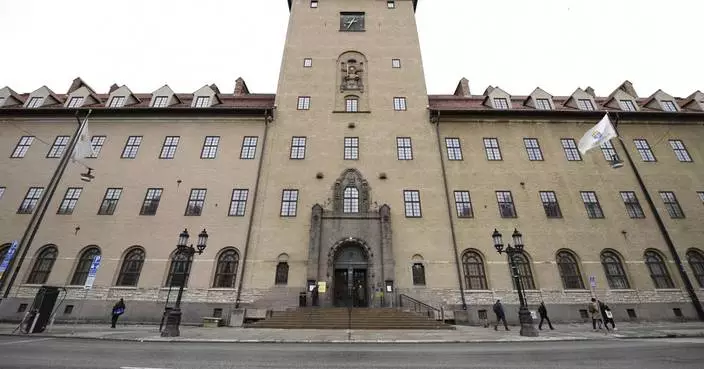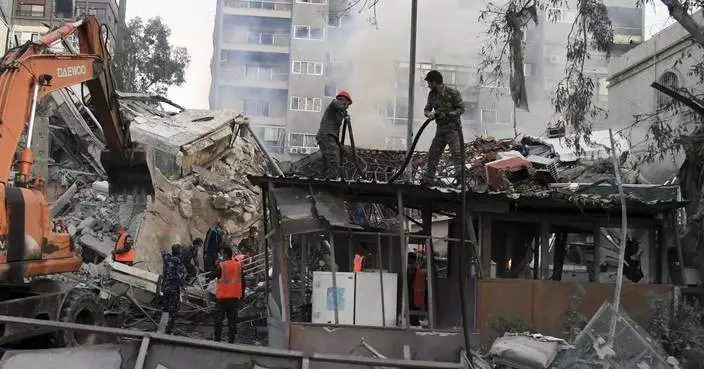An airstrike on a rebel-held village in northwestern Syria hit a poultry farm where several displaced families were taking shelter early Thursday, killing at least 15 people including children and wounding several others, opposition activists said.
The activists blamed Russian warplanes for the strike on Maaret Musreen village, which is home to thousands of internally displaced people.
The strike came hours ahead of a meeting between Turkish President Recep Tayyip Erdogan and Russian President Vladimir Putin to discuss the escalation in Syria's northwestern Idlib province, which comes amid a monthslong Russian-backed Syrian government offensive there.
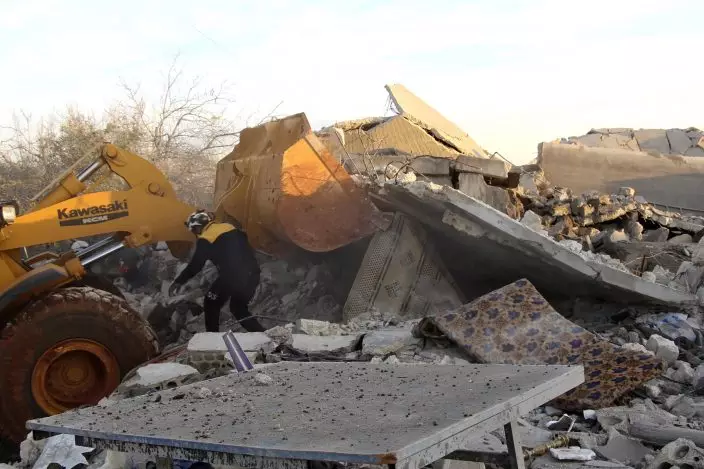
In this photo provided by the Syrian Civil Defense White Helmets, which has been authenticated based on its contents and other AP reporting, Syrian White Helmet civil defense workers supported by a bulldozer search for victims from under the rubble of a destroyed house that was hit by Syrian government and Russian airstrikes, in Maaret Musreen village, in Idlib province, Syria, Thursday, March 5, 2020. An airstrike on a rebel-held village in northwestern Syria early Thursday.. (Syrian Civil Defense White Helmets via AP)
The fighting in Idlib — Syria's last remaining rebel stronghold — has killed hundreds and displaced nearly a million people, many of whom have fled north toward the border with Turkey.
Turkey and Russia are the two main power brokers in Syria and each supports rival sides in the nine-year conflict.
Violence worsened in Idlib in recent weeks, with Turkey sending thousands of troops into the area to support Syrian insurgents holed up there. But Erdogan hasn’t been able to stop Syrian President Bashar Assad's offensive, which began in early December.
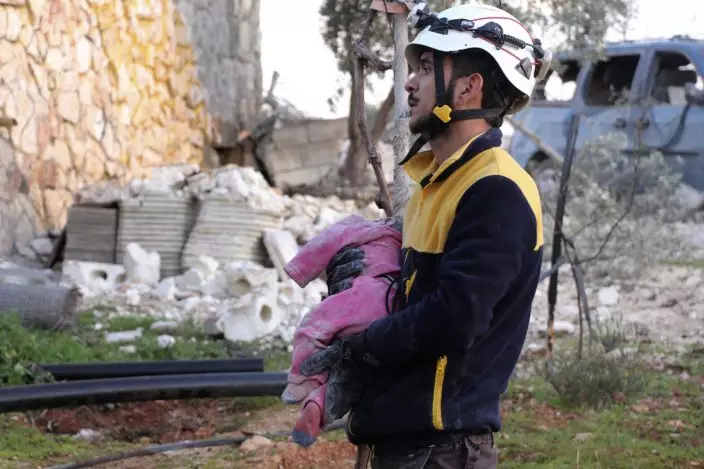
This photo provided by the Syrian Civil Defense White Helmets, which has been authenticated based on its contents and other AP reporting, a Syrian White Helmet civil defense worker carries a child victim after Russian airstrikes hit Maaret Musreen village, in Idlib province, Syria, Thursday, March 5, 2020. An airstrike on a rebel-held village in northwestern Syria early Thursday. (Syrian Civil Defense White Helmets via AP)
Syrian and Turkish troops have engaged in deadly battles, leaving at least 58 Turkish soldiers dead since the beginning of February as well as scores of Syrian soldiers.
The Britain-based Syrian Observatory for Human Rights said Thursday's airstrike hit a poultry farm used a settlement for internally displaced Syrians, killing 15 people including women and children. It said 18 others were wounded.
The opposition's Syrian Civil Defense, also known as the White Helmets, also blamed Russian warplanes for the strike. They said 14 people were killed, including five women and two children.
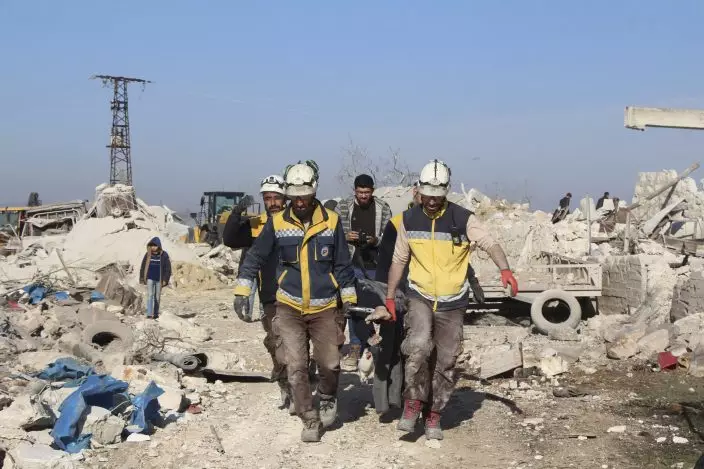
In this photo provided by the Syrian Civil Defense White Helmets, which has been authenticated based on its contents and other AP reporting, Syrian White Helmet civil defense workers carry a victim next of destroyed houses hit by Russian airstrikes, in Maaret Musreen village, in Idlib province, Syria, Thursday, March 5, 2020. An airstrike on a rebel-held village in northwestern Syria early Thursday. (Syrian Civil Defense White Helmets via AP)
Photos of the strike posted by the Civil Defense showed paramedics using a bulldozer to remove a ceiling that had apparently collapsed over people. The group said it had finished recovering bodies from under the rubble by Thursday morning.
Step news agency, an activist collective, said 16 people were killed including five children and also said that 18 people were wounded.
Such discrepancies on casualty figures are not uncommon in the immediate aftermath of attacks in Syria.
BEIRUT (AP) — Amnesty International said Wednesday it has documented widespread abuses, including torture and deprivation of medical care, in detention facilities holding thousands of suspected Islamic State members and their relatives in northeast Syria.
The centers and camps hold about 56,000 people — the majority of them children and teens — and are run by local authorities affiliated with the U.S.-backed, Kurdish-led Syrian Democratic Forces. The SDF and its allies, including U.S.-led coalition forces, defeated the Islamic State group in Syria in 2019, ending its self-proclaimed Islamic “caliphate” that had ruled over a large swath of territory straddling Iraq and Syria.
What to do with the suspected IS fighters and their families has become an intractable issue. Many countries whose citizens traveled to Syria to join IS have been reluctant to repatriate them, as have local communities in Syria.
"People held in this system are facing large-scale violations of their rights, some of which amount to war crimes,” Nicolette Waldman, Amnesty’s senior crisis advisor, told journalists.
The United States is also responsible for the alleged violations because it played a key role in establishing and maintaining the detention system, providing hundreds of millions of dollars to the SDF and affiliated forces and regularly interrogating detainees, Waldman said.
The human rights group interviewed 126 people accused of IS affiliation currently or formerly detained, along with representatives of the local administration and aid workers.
The Amnesty report said the vast majority of detainees are being held “indefinitely, without charge or trial, in violation of international human rights law and international humanitarian law,” while those who have been tried were, in many cases, convicted on the basis of confessions extracted under torture.
The alleged abuses include “beating, stress positions, drowning, electric shocks and gender-based violence,” including a male detainee who said he and others had been sodomized with broomsticks by guards, the report said. Detainees were also deprived of food, water and medical care and subjected to extreme cold and heat in overcrowded cells, with some allegedly dying of suffocation, it said.
The report added that many of the approximately 14,500 women and 30,000 children held had been victims of human trafficking, including women who were forced to marry IS fighters and minors who were forcibly recruited by the group, and that local authorities had failed to set up a “mechanism to identify trafficking victims” and protect them.
The report also criticized the practice of forcibly separating adolescent boys — some as young as 11 or 12 — from their mothers and placing them in rehabilitation centers indefinitely.
Amnesty called on local authorities, the U.S. government and other allies to bring the detention system into compliance with international law and urged the United Nations to work with them to establish a screening process to release all who are not “reasonably suspected” of having committed a serious crime.
The Autonomous Authorities of the North and East Syria Region, the civilian administration affiliated with the SDF, wrote in response to the Amnesty findings that it had not received any official complaints regarding torture in detention facilities and “if this happened, they are individual acts.”
The administration said it would take action against employees who committed violations if evidence is provided. It denied allegations that inmates were deprived of food, water and medical care. It acknowledged overcrowding in the facilities, which it attributed to lack of financial resources to secure larger centers.
The local authorities took issue with the allegation that people were arbitrarily detained, asserting that most detainees “are members of a terrorist organization and were arrested during the battles" and that many had committed crimes against humanity and war crimes.
The U.S. State Department said in its own response that “we share many of (Amnesty’s) concerns” and it has been working to address them. It called on the international community to “aid local entities’ management of these challenges” and for countries with citizens held in detention in Syria to repatriate them.
Waldman said she believes Washington "very likely knew about these poor conditions from the beginning."
She added: “We think that it may not be the case that they are doing everything they can. They need to accept a much greater responsibility, especially since they played such a key role in establishing the situation in the first place."
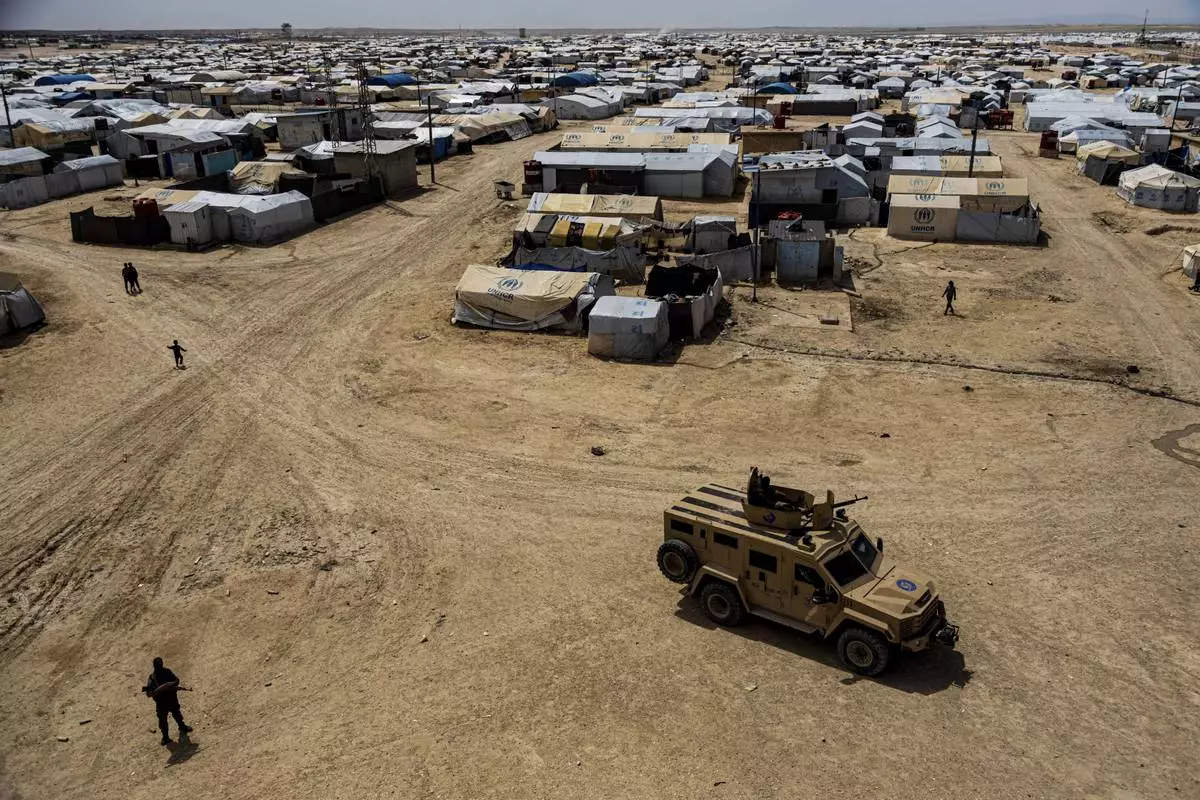
FILE - Kurdish forces patrol al-Hol camp, which houses families of members of the Islamic State group in Hasakeh province, Syria, on April 19, 2023. Amnesty International said Wednesday, April 17, 2024 it has documented widespread abuses, including torture and deprivation of medical care, in detention facilities holding thousands of suspected Islamic State members and their relatives in northeast Syria. (AP Photo/Baderkhan Ahmad, File)
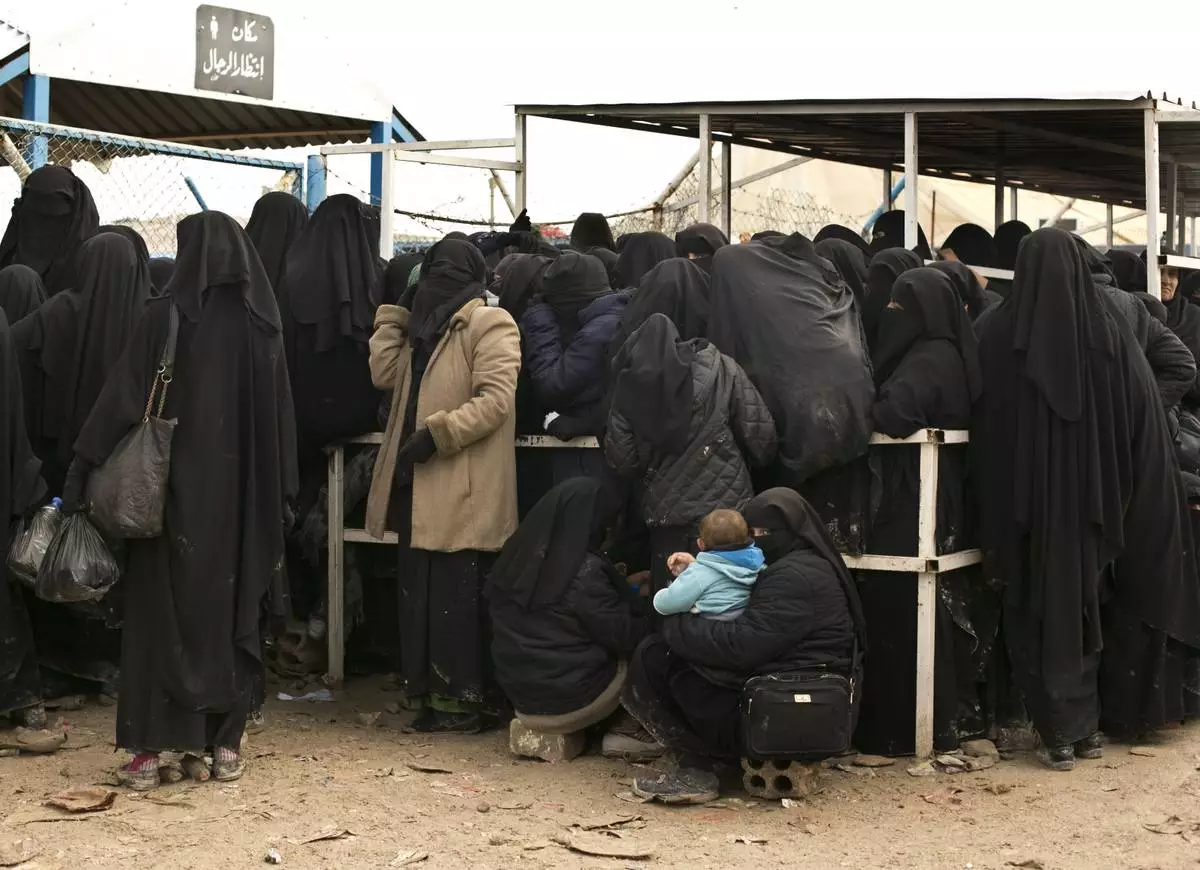
FILE - Women residents from former Islamic State-held areas in Syria line up for aid supplies at Al-Hol camp in Hassakeh province, Syria, March 31, 2019. Amnesty International said Wednesday, April 17, 2024 it has documented widespread abuses, including torture and deprivation of medical care, in detention facilities holding thousands of suspected Islamic State members and their relatives in northeast Syria. (AP Photo/Maya Alleruzzo, File)










